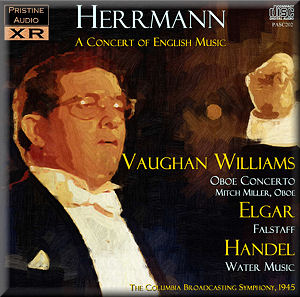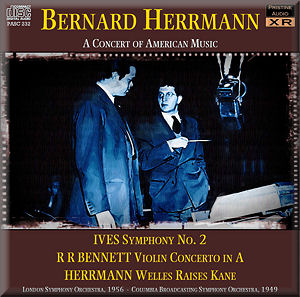 |
 |
| 
Availability
Sound Samples, CD & Download: Pristine
Audio
|
A Concert of English Music
George Frederick HANDEL
Water Music Suite (arr. Harty) [11:45]
Ralph VAUGHAN WILLIAMS
Concerto for Oboe and Strings in A minor [20:44]
Edward ELGAR
Falstaff, Op. 68 [32:40]
Announcements [7:41]
 Mitchell "Mitch" Miller (oboe)
Mitchell "Mitch" Miller (oboe)
The Columbia Broadcasting Symphony/Bernard Herrmann
rec. CBS live radio broadcast, 9 September 1945, introduced by Sidney
Berry, from the archive of Edward Johnson. mono
Transfers and XR remastering by Andrew Rose at Pristine Audio, November
2009
 PRISTINE AUDIO PASC202 [75:50]
PRISTINE AUDIO PASC202 [75:50]  |

Availability
Sound Samples, CD & Download: Pristine
Audio
|
A Concert of American Music
Charles
IVES
Symphony No. 2 (1897-1901) [37:50]
rec. BBC studio broadcast, 25 April 1956. UK première
Robert RUSSELL BENNETT
Violin Concerto in A (in the Popular Style) (1941) [22:33]
 Louis
Kaufman (violin) Louis
Kaufman (violin)
London Symphony Orchestra/Bernard Herrmann
rec. BBC studio recording, 20 May 1956. UK broadcast première
Bernard HERRMANN
Welles Raises Kane (Orchestral suite from his music for 'Citizen
Kane' & 'The Magnificent Ambersons') (1943) [14:23]
Columbia Broadcasting Symphony Orchestra/Bernard Herrmann
rec. CBS radio broadcast, 3 July 1949
Transfers by Andrew Rose from Edward Johnson's private collection.
XR remastering by Andrew Rose at Pristine Audio, June 2010
 PRISTINE AUDIO PASC 232 [76:44]
PRISTINE AUDIO PASC 232 [76:44]  |
| |
Bernard Herrmann was a renowned Anglophile but also had held
a far from unexpected torch for the music of his own country.
These two discs - separately available - reflect these twin
sympathies. The recordings are all mono.
The Concert of American Music launches with two BBC studio broadcasts
made with the LSO during the conductor's visit to London in
1956; between film scores as it were. The Ives Second Symphony
here receives its UK premiere. Herrmann is flexible and responsive
to the surging and stormy Brahmsian aspects of the work as well
as its many tender moments. It's a very fine reading which will
hold irresistible appeal for Brahms and Ives specialists. The
sound is however too treble-raw to command attention beyond
specialists. The music fairly flies along in the finale which
also glances affectionately towards Dvořák. You
need to brace yourself for some disorientating bombast as well
but it's magnificent stuff with flavour added by a tangy 1950s
announcer. The Robert Russell Bennett Violin Concerto
- here also receiving its UK premiere - has been recorded before
under Herrmann (see
review). This recording is in much better heart than the
Ives. It has a tumultuous power and only the slightest hint
of overload. Kaufman powers this exacting and exciting tonal
work forward. It's alive with the virtuoso's vade mecum
of sensational yet musical tricks, hooks and turns. All very
entertaining - casual, tuneful, jazzy; a touch of Broadway here,
a slice of Walton there. There are some fleeting tape flaws
in the sweetly haunting Andante moderato but things romp
along like populist greased lightning in the oh so short Vivace.
Blink and it's gone. The final Allegro reeks of the Russian
delights of the 1940s: well the Khachaturian anyway. Sparks
and smithereens fly everywhere. It's a splendid piece even if
it does owe a bit to other voices - the then recently deceased
Gershwin included. Lots of fun! As a recording it is far easier
to enjoy than the Ives. Kaufman
also deserves Hall of Fame elbow-room as does Rosand
for his VAI disc of Norwegian Radio concerts.
Welles Raises Kane: "A divertissement of the 1890s"
- is a five part suite magpied from his two classic film scores:
Citizen Kane and The Magnificent Ambersons. The
music majors on the flouncy over-wheening confidence of the
pre-Great War era. Those whooping horns suggest Arnold but much
else hints at Copland. It’s another lost world of conspicuous
consumption: grand hotels, potted palms, feathered hats, spats
and brushed velvet top hats. There's an affinity with the world
of Barber's Souvenirs. Even in a piece such as Ragtime
the music is laden with lavish affluence. The Meditation
presents the touchingly romantic Herrmann with a violin silvering
that tests the recording to the edge and beyond. The finale
flashes and erupts in a mass of swirling petticoats - Offenbach
meets Prokofiev's Classical on steroids. The recording
is from a CBS broadcast - older than the other two items
but generally pretty good though not quite up to the standard
on the English music collection.
Speaking of which that CD (each is separately available) features
all CBS network 1940s recordings; nothing from London this time.
Even the East Coast announcer accents are nostalgic. The delivery
for the introduction to the Handel is in measured tones.
The gruff marcato of the suite barks with precise rhythmic discipline
and works up a joyous bounce.
The Vaughan Williams Concerto comes armed with the dignified
and forthright tone of Mitch Miller's oboe. It's all very closely
miked as is typical of these recordings. That said the strings
do preserve a certain silkiness. Miller's clarity and perky
muscularity is a delight but it is at the expense of a little
feeling being leached out. The soloist enjoys a high prominence
in the audio picture throughout - not quite a Heifetz balance
but leaning that way. Even so the care-free insouciance of the
finale strikes the mot juste.
The Herrmann I expected least from on this disc actually delivered
the most. I have always had a soft spot for Elgar's Falstaff
- ever since I had the EMI LP that included the Barbirolli
version with Enigma. Then again my attention has tended
to drift off in the middle even with the Barbirolli. Be warned:
my tastes in Elgar may be suspect. I have little if any time
for the big choral works, less still for the 1970s Boult in
the symphonies and a preference for the passionate Solti and
Sinopoli. With that as the backdrop this Falstaff is
excellent. Moods, episodes and interludes are vividly painted
and character leaps out at the listener. It's consistently most
enjoyable down to the young King's betrayal, the tender reminiscences
in the orchard and the final Froissart-style chivalric
surge with lances at high port. Elgarians must hear this. The
announcer reads through the superscriptions for each segment
of the work before it begins. Falstaff plays as it should
- without interruption.
Herrmann was very active and extremely enterprising in his choice
of repertoire for CBS so it would be welcome indeed if there
were further Pristine issues from that source. He gave US premieres
of works by Finzi, Rubbra and RVW and there's plenty more, I
am sure. Whether other recordings survive is another matter
altogether.
These two discs of archive mono Herrmann recordings open up
a world thought lost. The English collection is to be preferred.
The sound of the American one can be testing though the rapturously
showy Bennett concerto will have you forgiving everything else.
Rob Barnett
|
|
|












